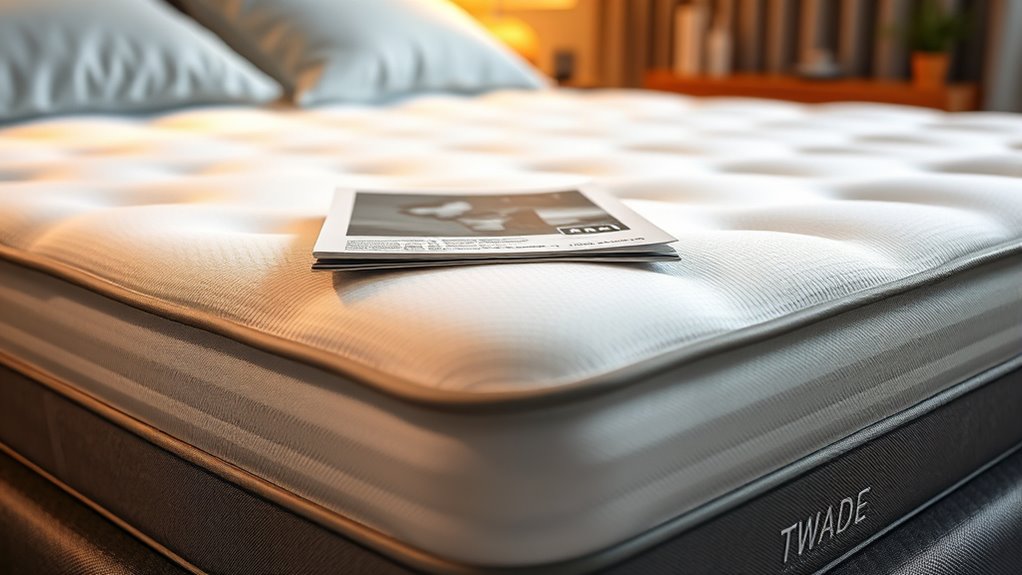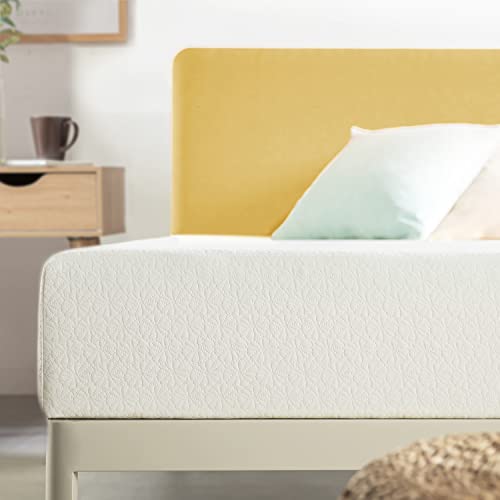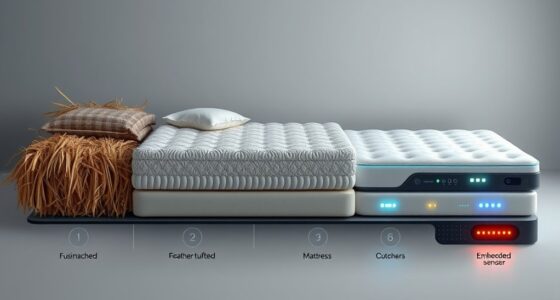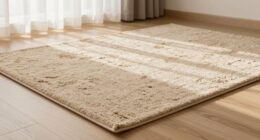Understanding mattress warranties and trial periods helps protect your investment and ensure you find the right fit for your sleep needs. Warranties usually cover manufacturing defects and structural issues, lasting from a few to several years, depending on the brand. Trial periods let you test comfort and support at home, giving you peace of mind. Knowing these details can help you make an informed choice—keep exploring to learn more about what to look for.
Key Takeaways
- Warranties typically cover manufacturing defects and sagging, with duration varying based on brand and model.
- Trial periods allow testing mattress comfort and support at home before committing, often ranging from 30 to 120 days.
- Longer warranties often indicate higher-quality materials and construction, offering better protection over time.
- Understand warranty terms about coverage limits, such as sag depth or layer breakdown, to assess true protection.
- Material type (memory foam, latex, hybrid) impacts durability, comfort, and how well the mattress maintains support during its lifespan.

When shopping for a new mattress, understanding the warranty and trial options can make all the difference in ensuring you get the right fit. It’s essential to look beyond the price tag and pay attention to the details that protect your investment. Warranties typically cover manufacturing defects and structural issues, but the specifics can vary greatly. Some warranties last for several years, while others might be shorter, so it’s vital to read the fine print. Knowing what’s covered can save you headaches later on if your mattress develops sagging, lumps, or broken springs. Equally important are trial periods, which allow you to test the mattress in your home before making a final commitment. A generous trial period gives you the time to assess comfort, support, and how well the mattress adapts to your sleep style.
When evaluating warranty and trial options, consider the mattress’s sleep technology and materials, as these often influence both comfort and durability. Modern sleep technology, such as memory foam, latex, or hybrid designs, can markedly impact how long your mattress maintains its supportive qualities. For example, memory foam mattresses contour to your body, providing pressure relief, but some may sag or develop impressions over time if made with lower-quality materials. Latex offers durability and resilience, often backed by longer warranties, because it resists sagging and retains its shape longer. Hybrid mattresses combine innerspring coils with foam or latex layers, aiming to strike a balance between support and comfort, but the longevity depends heavily on the quality of mattress materials used.
You should also scrutinize the warranty’s terms concerning sleep technology. Some warranties explicitly cover issues related to sagging beyond a certain depth or layer breakdown, which directly relates to the quality of the mattress materials and how well they resist wear. A good warranty should specify the conditions under which repairs or replacements are granted, ensuring that you’re protected if the mattress deteriorates prematurely. When it comes to trial periods, check whether you can return the mattress if you find that your sleep technology isn’t meeting your needs—whether it’s firmness, temperature regulation, or support. A flexible trial period gives you peace of mind, knowing you can switch if your chosen mattress doesn’t deliver the promised comfort. Additionally, understanding the material composition of the mattress can help predict its durability and how well it will hold up over time.

SLEEP TITE Hypoallergenic 100% Waterproof Mattress Protector – 15-Year U.S. Warranty – Vinyl Free – Queen
Protects against all fluids and most allergens
As an affiliate, we earn on qualifying purchases.
As an affiliate, we earn on qualifying purchases.
Frequently Asked Questions
Do All Mattress Warranties Cover All Types of Damage?
Not all mattress warranties cover every type of damage. You should check for warranty exclusions and damage limitations, as some warranties only cover manufacturing defects and exclude issues like stains, normal wear and tear, or physical damage. Always read the fine print carefully so you know what’s covered and what’s not. This way, you won’t be surprised if a certain damage isn’t eligible for repair or replacement under your warranty.
Can I Extend My Mattress Trial Period?
You might be able to extend your mattress trial period, but it depends on the retailer’s trial extension policies. Check the warranty eligibility and trial extension policies carefully, as some companies offer extensions if you contact customer service within a specific timeframe. Keep in mind, extensions aren’t guaranteed, so it’s best to review the store’s policies before making a decision. Always clarify trial extension options upfront.
Are There Any Fees for Warranty Claims?
When you file a warranty claim, you might wonder about fees. Typically, there are no fees for making a claim, but warranty exclusions and coverage limitations can vary by brand. Some issues, like normal wear or damage from misuse, may not be covered, and you could be responsible for shipping or inspection costs. Always review your warranty’s terms to understand what’s included and any potential charges upfront.
How Does the Return Process Work After a Trial?
Imagine returning your mattress like a sneaky ninja slipping away unnoticed. After your trial, you’ll typically initiate return logistics through the retailer’s website or customer service. Be aware of trial limitations—some brands impose time limits or require the mattress to be in original condition. You’ll often need to schedule a pickup or drop-off, and then the company processes your refund, hopefully without turning you into mattress-escaping ninja.
What Are Common Reasons for Warranty Denial?
You might face warranty denial if your mattress has damage limitations like tears, burns, or stains that fall outside coverage. Warranty exclusions often include issues caused by misuse, improper foundation, or neglect. Make certain you follow care instructions, as improper handling can void your warranty. If damage results from accidents or normal wear and tear, the manufacturer may deny your claim, so keeping documentation and understanding coverage terms helps protect you.

UniPon Firm Queen Mattress, 14 Inch Deep Sleep Hybrid Mattress with Extra Back & Hip Support, Motion Isolation with Fiberglass-Free, CertiPUR-US Certified, 365-Night Trial
UniPon 14 Inch Firm Queen Mattress
As an affiliate, we earn on qualifying purchases.
As an affiliate, we earn on qualifying purchases.
Conclusion
Now that you know the ins and outs of mattress warranties and trials, you’re practically a sleep superhero! With this knowledge, you can dodge mattress disasters and sleep like royalty every single night. Don’t settle for a mediocre mattress—arm yourself with these tips and turn your sleep into a fortress of comfort. Remember, a great mattress isn’t just a choice; it’s your ticket to waking up every morning feeling like you’ve conquered the world!

Best Price Mattress 8 inch Twin Mattress XL Long, Bed-In-A-Box, Green Tea Memory Foam,White
[Experience Blissful Comfort] – Drift into a world of luxurious comfort on our memory foam mattress. The memory…
As an affiliate, we earn on qualifying purchases.
As an affiliate, we earn on qualifying purchases.

UniPon Firm Queen Mattress, 14 Inch Deep Sleep Hybrid Mattress with Extra Back & Hip Support, Motion Isolation with Fiberglass-Free, CertiPUR-US Certified, 365-Night Trial
UniPon 14 Inch Firm Queen Mattress
As an affiliate, we earn on qualifying purchases.
As an affiliate, we earn on qualifying purchases.








